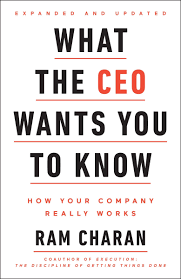In today's rapidly evolving business landscape, understanding fundamental business principles is crucial for leaders and employees at all levels. Ram Charan's What the CEO Wants You to Know distills core business concepts into simple, actionable insights that drive success across industries. This white paper explores the key takeaways from the book and their relevance to modern businesses, particularly in IT and cold storage industries.
White Paper: Key Business Insights from "What the CEO Wants You to Know" by Ram Charan
Introduction
In today's rapidly evolving business landscape, understanding fundamental business principles is crucial for leaders and employees at all levels. Ram Charan's What the CEO Wants You to Know distills core business concepts into simple, actionable insights that drive success across industries. This white paper explores the key takeaways from the book and their relevance to modern businesses, particularly in IT and cold storage industries.
Core Business Principles
Charan identifies four fundamental principles that underpin every business, from small enterprises to multinational corporations:
- Cash Generation – The ability of a business to generate cash determines its sustainability and growth. Understanding cash flow helps leaders make informed financial decisions and ensure operational stability (Charan, 2017).
- Return on Assets (ROA) – Efficient utilization of company resources leads to higher profitability. This principle is particularly relevant in asset-intensive industries like cold storage, where maximizing infrastructure usage is critical (Readingraphics, 2020).
- Growth – Sustainable growth depends on balancing expansion with profitability. IT businesses, such as Keen Computer, can apply this by leveraging scalable solutions that drive revenue while managing costs effectively (Commoncog, 2021).
- Customers – Understanding and meeting customer needs is the foundation of long-term business success. Companies must tailor their offerings to solve real customer problems, ensuring loyalty and competitive advantage (Penguin Random House, 2017).
Business Acumen and Decision-Making
Charan emphasizes the importance of business acumen, which involves:
- Identifying key business drivers and focusing on top priorities.
- Making strategic decisions despite complex challenges.
- Aligning teams towards common business goals (HelloPM, 2021).
For IT firms, this means staying ahead of technological trends while managing operational risks. In the cold storage sector, decision-making revolves around optimizing logistics, energy consumption, and regulatory compliance.
Use Cases and Practical Applications
Use Case 1: IT Industry (Keen Computer)
Challenge: Keen Computer, an IT services company, struggled with inconsistent cash flow due to delayed payments from enterprise clients.
Solution: By implementing automated invoicing and flexible payment plans, the company improved cash collection efficiency and ensured steady revenue inflow.
Outcome: Cash reserves increased, enabling investment in R&D and talent acquisition, leading to higher customer satisfaction and growth.
Use Case 2: Cold Storage Industry (Icebercold)
Challenge: Icebercold, a cold storage company, faced high energy costs due to inefficient refrigeration management.
Solution: IoT-based smart monitoring systems were installed to optimize energy usage by tracking real-time temperature and automating adjustments.
Outcome: The company achieved a 25% reduction in energy costs and improved asset utilization, enhancing profitability.
Use Case 3: Retail Sector
Challenge: A regional grocery chain suffered from inventory mismanagement, leading to stock shortages and excess waste.
Solution: Implementing AI-driven demand forecasting allowed better inventory control, reducing waste and ensuring product availability.
Outcome: Revenue increased by 15%, with lower operational costs and higher customer retention.
Practical Applications in IT and Cold Storage
IT Industry (Keen Computer)
- Cash Flow Management: Managing subscription-based revenue models to ensure financial stability.
- ROA Optimization: Investing in efficient cloud infrastructure to maximize computational resources.
- Growth Strategy: Scaling software solutions while maintaining customer satisfaction and support.
- Customer Focus: Enhancing user experience through continuous innovation and agile development.
Cold Storage Industry (Icebercold)
- Cash Flow: Ensuring cost-effective operations to manage seasonal demand fluctuations.
- Asset Utilization: Maximizing warehouse efficiency through automation and IoT-based monitoring.
- Sustainable Growth: Expanding storage capacity while optimizing energy efficiency.
- Customer-Centric Approach: Offering tailored storage solutions for perishable goods with real-time tracking.
Conclusion
By internalizing Charan’s business fundamentals, companies can enhance profitability, resilience, and long-term success. Whether in IT, cold storage, or any other sector, mastering cash flow, asset utilization, growth strategies, and customer focus ensures a strong competitive position.
References
- Charan, R. (2017). What the CEO Wants You to Know: How Your Company Really Works. Penguin Random House.
- Readingraphics. (2020). What the CEO Wants You to Know - Book Summary. Retrieved from https://readingraphics.com
- Commoncog. (2021). What the CEO Wants You to Know - Key Takeaways. Retrieved from https://commoncog.com
- HelloPM. (2021). Book Summary - What the CEO Wants You to Know. Retrieved from https://hellopm.co
- Penguin Random House. (2017). What the CEO Wants You to Know - Expanded and Updated. Retrieved from https://www.penguinrandomhouse.ca
- Harvard Business Review. (2019). The CEO's Guide to Business Fundamentals. Retrieved from https://hbr.org
- Forbes. (2021). How Business Acumen Can Drive Organizational Success. Retrieved from https://www.forbes.com
This white paper provides a structured approach to understanding business fundamentals and their real-world applications in different industries.
